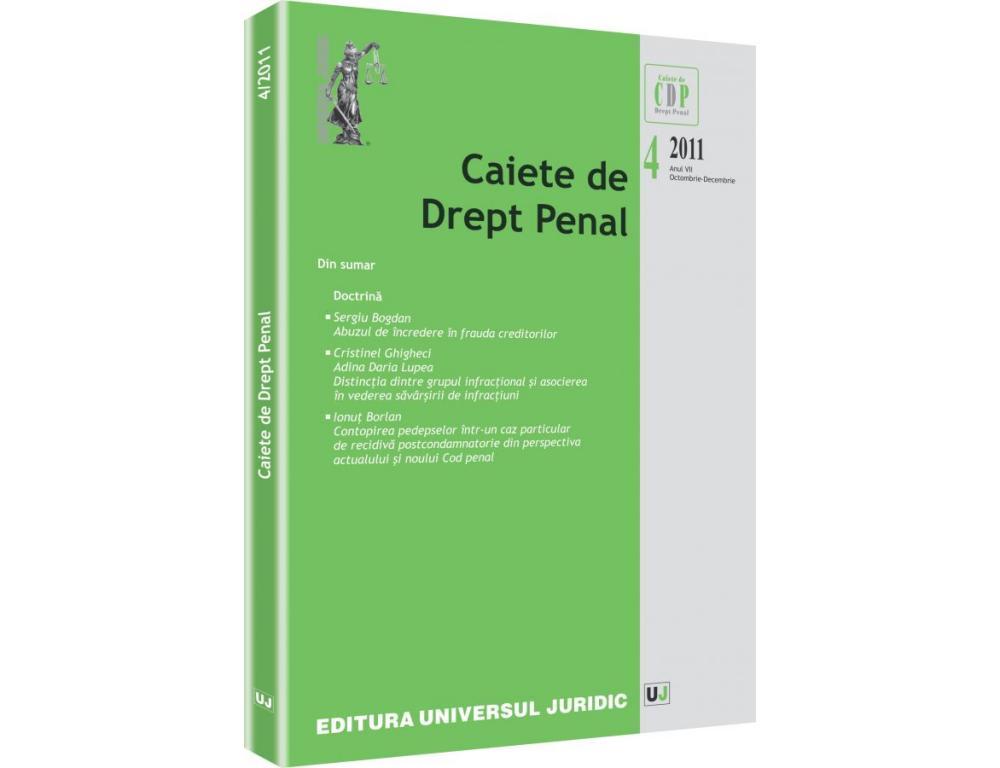Abuzul de încredere în frauda creditorilor
Making Off Without Payment
Author(s): Sergiu BogdanSubject(s): Law, Constitution, Jurisprudence, Civil Law
Published by: Universul Juridic
Keywords: making off without payment; reason behind enactment of new Criminal law provisions; text contents; intervention of penal law in the debtor-creditor;
Summary/Abstract: In the present study, the author analyses the reason lying behind the enactment of the new criminal provisions, such as the offence set out in art. 239, paras 1 and 2 in the New Penal Code. In a comparative approach, the author also addresses the reason and contents of equivalent criminal provisions. As concerns art. 239 para 1 in the New Penal Code, the author sustains that it has a double nature, on one hand it protects the interests of creditors (thus reminding of the socalled Paulian action from civil law) and on the other hand, it implicitly protects the creditworthiness of legal rulings, which could be affected by the conduct of such debtors, by that their conduct could entail that a legal decision ordering forced execution may be perceived as a document of no value for the creditor. It becomes obvious that in the end the creditor would bear the cost of an artificial state of insolvency created by the debtor. The state would thus incur reproaches as to the inefficiency of its judicial system. This text penalizes the acts that are equivalent to bankruptcy fraud which, until the coming into force of the New Penal Code, applies only to parties involved in commercial activities. The text content has been extended as regards the notion of “debtor”, by that the state of insolvency is only implicitly limited, due to the fact that the texts refers to an offence leading to certain degree of dangerousness, but bearing no immediate, material outcome. The legal text is also limitative, since it expressly enumerates the ways by which the state of insolvency could be „created” or „organized”. As far as art. 239 para 2 is concerned, the author states that it is conceptually autonomous from art. 239 para 1, therefore the offences can be concurrent. Regarding art. 239 para 2, the author considers that, traditionally, this act could not be interpreted as fraud, since there is no act of defrauding committed by the offender, but only an omission of a debtor to inform the supplier of goods or services that he cannot pay the services he has solicited. The act could neither be treated as theft, since the supplier is not deprived of any good by withdrawal of said good, he is only caused damage by lack of payment for the service or good already supplied by the trader. Such a text is already provided in most penal systems (e.g. French, English, Italian, Swiss etc). The author states that by penalizing such acts, the legislator aims at restoring the balance as regards the loss-benefit possibility in such types of relations between the supplier of services and their beneficiary. It is interesting to note that this text has been set out in the Romanian penal system in the context in which during the last decades, consumer law has been created and developed in order to re-establish a fair balance between the trader, who enjoys a privileged position, and the consumer. In the Romanian system, following the re-emergence of the market economy, such situations has to be solved, not only by creating increased possibilities for the supplier to be paid by a beneficiary of the service rendered, but at least by discouraging the making off without payment, through the risk of penal sanctions. Therefore, the author considers that the cultural habits of the society we live in justify such a mechanism of penal intervention. The author criticizes the content based on a too general approach, the text being applicable to any acquisition of goods and services, given that certain traders can protect themselves, with no need for criminal law to intervene in their favour.
Journal: Caiete de drept penal
- Issue Year: 2011
- Issue No: 04
- Page Range: 11-25
- Page Count: 15
- Language: Romanian
- Content File-PDF

